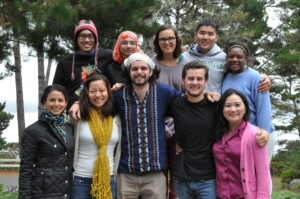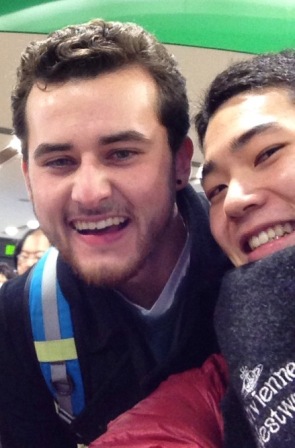Contributed by Stuart Haruyama, 2013-14 Shinnyo Fellow

Wiping the sleep away from my eyes, I push my way through the vast caverns and concourses of Tokyo’s Shinjuku train station. At 7 a.m., the masses of movement flowing in all directions disorientate me, as I quickly attempt to scan around looking for my own platform. I feel as if half of Tokyo has suddenly descended upon this very station, each and every person like me quickly trying to board his or her own train and depart. After several wrong turns, I finally find my train destined for Tokyo’s western suburbs. Every gap in the train is filled with suitcases and warm bodies, but I manage to find a comfortable standing position against the window. Glancing up at the route information above, I locate my destination in kanji characters on the map: 立川 (Tachikawa). The nifty time tracker says 40 minutes to my destination. Time for a quick nap I think.
My path to Tachikawa began many years before that train ride, before I could place it on a map, to be frank. That path has taken me to social service organizations neighboring my undergraduate university, through boundary-breaking conversations on my university campus, and off to exciting new adventures domestically and abroad. But the thread that runs through it all, the needle that strings it all together, is Shinnyo-en Foundation and the communities I have been blessed to become a part of as a result.
My first encounter with Shinnyo-en Foundation was as an undergraduate student at Seattle University. When I arrived on campus as freshman, I was excited about the opportunities to engage in social justice work. But really, my enthusiasm and zeal was masking deep uncertainty and questioning. What is my place, as a person of privilege, in a world that is marred by social inequality and injustice? And more personally, how can I mature into a leader when my natural inclination is to listen and to follow? I was looking for focus and direction, for guides to point me through my academic, co-curricular, and personal endeavors. Shinnyo-en became one of those pillars of support.

2013-14 Shinnyo Fellows
After being awarded a Shinnyo-en Summer Fellowship and the Shinnyo Fellowship for Community Leadership at Seattle University, I spent a summer working at a homeless service center in downtown Seattle called DESC. My tasks included teaching vocational classes and providing case management support. However, as the Center thinned out on warm summer afternoons, my responsibilities transferred to managing the day center, where I answered phone calls, prepared meals, and washed laundry. The space was ripe for conversation and friendly banter as folks moved in and out. Many of those faces and names have disappeared in the haze of my memory, but some exchanges remain imprinted on my memory. I remember Mark and his chauffeur enterprise, Pat’s transcontinental travel stories, and Shay’s pithy pick-up lines. It was during those long summer afternoons that I began developing a more defined sense of my vocation in the world. I did not have the patience and diligence to be a career social worker, but I found that my interest in listening and ability to empathize brought warmth to my relationships. In pursuing social change, I realized that the foundation of my work rested in the faces and stories of the wonderful individuals I was able to work with.

The relationships that I have built through my connections to Shinnyo-en Foundation have crisscrossed the country and the globe. In the fall of 2014, after graduating from Seattle University and relocating to Rhode Island, I was invited to participate in the Project Tsubasa Summit on Social Entrepreneurship at Harvard co-sponsored by the Foundation and the Center for Information on Religion, a research institution of the Shinnyo-en Order. Collaborating with participants spanning five continents and covering many different backgrounds and traditions, we were split into teams and tasked with developing a business plan that tackled real world social issues. Our team of five developed a business plan for Lele Café, a farm-to-table food company in Indonesia connecting individuals across the socio-economic strata of Indonesian society. Together, our group of five developed the guiding values of our business through our collective aspirations for the world: social awareness, inclusivity, and community empowerment. After just five short days, our team disbanded as we headed back to our homes across the world: Hannah to San Francisco; Adi to Indonesia, Jun to Malaysia, Hiro to Japan, and me back to my work in Rhode Island. Over the following weeks, we continued to communicate via email, asking each other how Lele Café might become a reality in the future, even as we lived our lives in separate corners of the world. Wisely, my new friend Hiro pulled us back from our business intentions: “through this summit, I found my mission for the future: Hearing the stories of others.” Hiro had hit the idea on the head. Lele Café lives on, in spirit if not reality, in the values in which we partnered on.
Which leads me back to that 7 a.m. train in Tokyo. After travelling through the dense sprawl of modern Tokyo, my train finally arrived at Tachikawa station. Stepping out, I followed the crowds moving toward the exit. Without a working phone, I was anxious that I would not be able to find my travel companion through the masses. But sure enough, on the other side of the exit, I located my Tsubasa friend, Hiro. “Ohayou Gozaimasu,” I said, feeling amazed that we were seeing each other again on the other side of the world. “Ohayou Gozaimasu,” Hiro replied, “you made it to Tachikawa!” We both chuckled. “Well, shall we visit the Shinnyo temple?” I heartily agreed, and together we set off through the streets of Hiro’s childhood to the Shinnyo-en Head Temple Complex, the spiritual epicenter of the Shinnyo-en Order. Arriving at the tall stone entryway to the complex, I took a moment to pay homage to the situation. Bowing once, I expressed gratitude for all the people who had brought me to this point. Bowing again, I prayed for the continuation of these relationships of peace and joy. Looking up, Hiro waved for me to follow him through the gate. “Come, there is still much to see!”

Thank you Shinnyo-en for your support and mentorship these last five years. Thank you for providing opportunities for me to continue to define my path to peace in this world. Thank you for creating the space for new relationships of peace and joy to develop. Arigatou.
